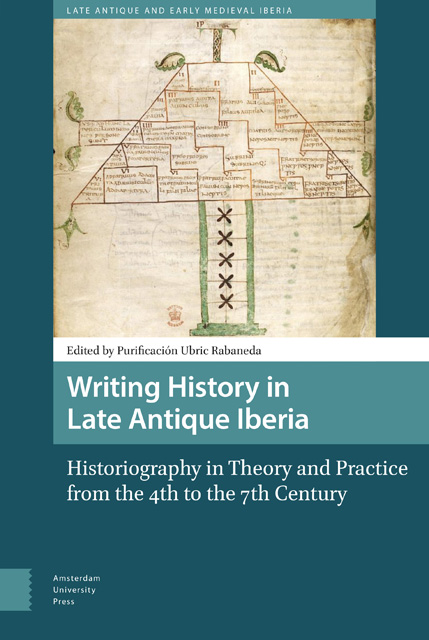 Writing History in Late Antique Iberia
Writing History in Late Antique Iberia Book contents
- Frontmatter
- Table of Contents
- 1 Writing History in Late Antique Iberia: Theory and Praxis
- 2 Para qué sirve la Historia : Principios teóricos de la historiografía hispana tardoantigua
- 3 From Christian Historiography to the Emergence of National Histories : Spanish Historiography between Romans and Visigoths
- 4 Orosius: An Iberian Patriot’s History of Rome
- 5 Orosius, Barbarians, and the Christian Success Story
- 6 Prophecies and Omens of the Fall of the Roman Empire in the Chronicle of Hydatius of Lemica
- 7 La dimensión política de los historiadores del reino visigodo de Toledo
- 8 The Definitions and Uses of Historia in Isidore of Seville
- 9 Bishops and Their Biographers : The Praxis of History Writing in Visigothic Iberia
- 10 Local Powers and Construction of the Past in the Visigothic Kingdom of Hispania
- 11 The Contemplation of the Past in the Libellus Precum of Faustinus (and Marcellinus)
- 12 Orthodoxy and Heterodoxy : The Historiography of Hispania in Late Antiquity
- 13 Expulsados de la Historia : El argumento histórico en la polémica antijudía hispana (siglos IV-VII)
- 14 Consideraciones sobre la temporalidad en las Vitae Sanctorum visigóticas
- 15 The Image of Leovigild as Arian Monarch in the ‘Vitas Patrum Emeritensium’ : From Historical Reality to Hagiographical Deformation
- Index
11 - The Contemplation of the Past in the Libellus Precum of Faustinus (and Marcellinus)
Published online by Cambridge University Press: 18 April 2023
- Frontmatter
- Table of Contents
- 1 Writing History in Late Antique Iberia: Theory and Praxis
- 2 Para qué sirve la Historia : Principios teóricos de la historiografía hispana tardoantigua
- 3 From Christian Historiography to the Emergence of National Histories : Spanish Historiography between Romans and Visigoths
- 4 Orosius: An Iberian Patriot’s History of Rome
- 5 Orosius, Barbarians, and the Christian Success Story
- 6 Prophecies and Omens of the Fall of the Roman Empire in the Chronicle of Hydatius of Lemica
- 7 La dimensión política de los historiadores del reino visigodo de Toledo
- 8 The Definitions and Uses of Historia in Isidore of Seville
- 9 Bishops and Their Biographers : The Praxis of History Writing in Visigothic Iberia
- 10 Local Powers and Construction of the Past in the Visigothic Kingdom of Hispania
- 11 The Contemplation of the Past in the Libellus Precum of Faustinus (and Marcellinus)
- 12 Orthodoxy and Heterodoxy : The Historiography of Hispania in Late Antiquity
- 13 Expulsados de la Historia : El argumento histórico en la polémica antijudía hispana (siglos IV-VII)
- 14 Consideraciones sobre la temporalidad en las Vitae Sanctorum visigóticas
- 15 The Image of Leovigild as Arian Monarch in the ‘Vitas Patrum Emeritensium’ : From Historical Reality to Hagiographical Deformation
- Index
Summary
Abstract
The Arian controversy, which, at the beginning, was nothing but a theological debate around the figure of Christ, very soon became the identity flag of the most important ecclesial factions of the fourth century. Although ideologically very close to the victorious Catholic faction, the authors of the Libellus precum lament the moral degradation of the victors and the opportunism of countless heretical clerics who have not hesitated to join the winning side. The faithful to the true doctrine, in whose name the Libellus is written, ask for protection from the emperor Theodosius, appealing to a social and religious past that they reconstruct from their peculiar and interested point of view, with abundant illustrations, positive and negative, of the Hispanic Church.
Keywords: Arian controversy, Luciferians, reconstruction of the past, persecution, rigorist
Although numerous sources exist from the second half of the fourth century that show concern for the situation in the Church in Hispania, perhaps the most passionate and eloquent is the Libellus precum by Faustinus and Marcellinus (hereafter, LP) In a particularly harsh manner, the authors detailed and denounced the opportunism, ambition, and worldly interests of many clerics who falsely proclaimed themselves as Catholics and, at the same time, persecuted those who remained faithful to the Nicene Creed with unusual cruelty. In a previous work, I described the verisimilitude of the events chronicled in the LP in the style of a pleading brief presented at court, and formally addressed to the three reigning emperors at that time (Valentinian II, Theodosius, and Arcadius). The authenticity of the story is also supported by the rescript, or Lex augusta (hereafter, LA), which offered an official response to the libellus , taking the truth and the seriousness of its content for granted.
Perhaps the most original aspect of this text is its recalling of the historical past in order to explain the current situation, particularly the doctrinal rectitude of some Nicenist loyals, who were unjustly persecuted by Catholic opportunists. To this end, its story highlights the most favourable events in their cause, and silences others that could have done it harm. The result could only be a particular reworking of the past, as we aim to show in the following pages.
- Type
- Chapter
- Information
- Writing History in Late Antique IberiaHistoriography in Theory and Practice from the 4th to the 7th Century, pp. 201 - 222Publisher: Amsterdam University PressPrint publication year: 2022


